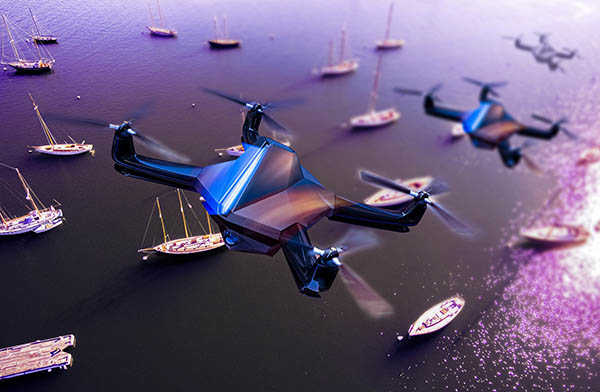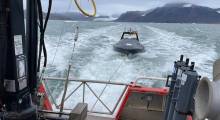The Mohamed Bin Zayed International Robotics Challenge (MBZIRC) is offering more than $3 million (U.S.) in prize money to participating innovators developing marine safety and security systems. It will take place in Abu Dhabi, capital of the United Arab Emirates, in June 2023.
ASPIRE, the dedicated technology program management pillar of the the UAE's Advanced Technology Research Council (ATRC), holds the MBZIRC every two years. The MBZIRC Maritime Grand Challenge will involve both aerial drones and maritime systems.
“We are proud that MBZIRC is going global by inviting the best talent from all over the world to participate,” stated H.E. Faisal Al Bannai, secretary general of the ATRC. “We have set a tough real-world challenge that will push the participants to the limits of their capabilities. The event is a great opportunity to demonstrate the pioneering scientific research work that is taking place in Abu Dhabi and the UAE.”
“This competition offers a one-of-a-kind opportunity to leading universities, research institutions, companies, and individual innovators from all over the world to explore a niche area in autonomous systems and develop a tool that could revolutionize maritime operations and help the world to cope with related challenges,” said Dr. Arthur Morrish, chief executive of ASPIRE.
MBZIRC Maritime Grand Challenge seeks collaboration
“The competition will push the boundaries of autonomous systems to find a practical and innovative solution to mission-critical maritime challenges facing the world such as piracy, illegal fishing, smuggling, and maintaining coastline security,” Morrish told Robotics 24/7.
“For countries with long coastlines, ensuring maritime safety requires significant investment in sophisticated equipment and highly trained personnel,” he said. “Using advanced robotic systems can not only help reduce costs, but also handle some of the often-dangerous tasks performed by humans. The motivation for holding the MBZIRC Maritime Grand Challenge is to take the technology out of the laboratory and test it in a real-world environment to see what is possible.”
The competition will require heterogeneous collaboration among unmanned aerial vehicles (UAVs) and unmanned surface vehicles (USVs) to perform complex navigation and manipulation tasks in a GNSS (Global Navigation Satellite System)-denied environment.
A swarm of UAVs must identify a target vessel from several similar vessels in open waters in a GNSS-denied environment. It must then offload specific items from the target onto an USV in the shortest possible time using autonomous technologies. Morrish said this is a new kind of exercise for robotics.
“A nice thing about this challenge is that you tell people what you want, but you don’t specify an approach to do it,” he said. “The very idea of the MBZIRC Maritime Grand Challenge is born out of our belief that partnership and collaboration will drive future advances in robotics.”
Morrish added that such smart systems could have other practical applications, especially if they can autonomously perform complex tasks in environments without satellite navigational guidance.
Requirements for participation
The competition is now open to registrants. The international response has been strong so far, said Morrish.
“It’s still early in the process, but we have had a great response so far,” he said. “We can confirm that we have interest from some top technology and engineering universities in the U.S. and around the world. Interest has also been shown by commercially focused organizations.”
In the white paper phase, each participating team is required to submit a paper by Dec. 30, 2021, describing the team and its background in swarm robotics, computer vision, and simultaneous localization and mapping (SLAM). Applicants must also list their marine vehicle expertise, communications capabilities, and the technical approach to be used in solving the challenge.
Teams will also need to submit proof-of-concept videos on the different sub-components of their system and demonstrate the feasibility of their approaches. The videos should cover the following aspects of the challenge:
- Multi-UAV search and inspection of large representative structures
- Intra-swarm communication and collective decision-making
- Collective transportation of objects between the large structure and the home location
In the simulation phase, the participating teams will be required to complete inspection and intervention tasks in simulation. In August 2022, this phase will include the shortlisting of the five finalist teams. A completion prize of $500,000 will be split among the teams progressing to demonstration phase.
In the demonstration phase in June 2023, teams will prove their system capabilities in an area of 10 square km (3.86 sq. mi.). Evaluation will be based on the total time required to complete the inspection and intervention tasks. This phase includes inspection, identification, and manipulation subtasks. The maximum mission completion time will be set at 50 minutes.
“The jury for each phase of the competition will be different,” noted Morrish. “They will comprise international experts in the domain of autonomous systems. At the moment, we are in the process of finalizing the judging panels. We will announce them in due course.”
The first prize in the MBZIRC Maritime Grand Challenge will be $2 million. The team placing second will receive $500,000, while the third-place team will win $250,000.
ASPIRE works to foster innovation
The UAE is a small country, but it has set its sights on being a leader in science and technology including robotics.
“Robotics-based industries will play a key role in the future knowledge-based economy of the UAE,” said Morrish. “The event aims to foster technological innovation and inspire the next generation of scientists in the UAE.”
“By providing an environment to foster innovation and technical excellence in robotics, MBZIRC also supports the UAE’s transition to a knowledge economy, while consolidating Abu Dhabi and the UAE’s position as an emerging hub of innovation in advanced technology.
ASPIRE plans to design several more international competitions in advanced technology to solve some of the world’s most pressing problems. The organization also works with cross-sector industry stakeholders, universities, and research institutes to frame problem statements.
Recently, ASPIRE has partnered with the XPRIZE Foundation to launch the “XPRIZE Feed the Next Billion” global competition. The initiative is co-funded by Ghadan 21, Abu Dhabi's accelerator program driving the emirate's investments in business, innovation, and people.
Article topics
Email Sign Up















